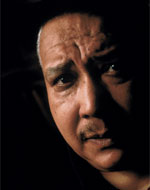|
|
 |
 |

Michael S. Harper
迈克尔-哈帕
  Harper has published more than ten books of poetry, including Dear John, Dear Coltrane, Debridement, Healing Song for the Inner Ear, History is Your Own Heartbeat, Honorable Amendments, Images of Kin, Nightmare Begins Responsibility and Songlines in Michaeltree: New and Collected Poems. He edited Chant of Saints, and with Anthony Walton, Every Shut Eye Ain't Asleep and The Vintage Book of African American Poetry. He is the first Poet Laureate of Rhode Island and an American Academy of Arts and Sciences fellow. His awards include the National Book Award and the Black Academy of Arts and Letters Award and fellowships from the Guggenheim Foundation and NEA. He is University Professor and Professor English at Brown University. He lives in Providence, Rhode Island. Harper has published more than ten books of poetry, including Dear John, Dear Coltrane, Debridement, Healing Song for the Inner Ear, History is Your Own Heartbeat, Honorable Amendments, Images of Kin, Nightmare Begins Responsibility and Songlines in Michaeltree: New and Collected Poems. He edited Chant of Saints, and with Anthony Walton, Every Shut Eye Ain't Asleep and The Vintage Book of African American Poetry. He is the first Poet Laureate of Rhode Island and an American Academy of Arts and Sciences fellow. His awards include the National Book Award and the Black Academy of Arts and Letters Award and fellowships from the Guggenheim Foundation and NEA. He is University Professor and Professor English at Brown University. He lives in Providence, Rhode Island.
哈帕已出版十本以上的诗集,包括:《亲爱的约翰,亲爱的科尔特兰》,《清创术》,《内耳的疗伤之歌》,《历史是你的心跳》,《光荣的修正案》,《亲属的意象》,《梦魇开启责任及迈克尔树中的歌词:新诗与诗集》。他编辑的书目有:《圣人的赞美诗》,《不是每次闭眼都会睡着》(与安东尼-沃尔顿合编),《古典书局非裔美国诗人诗歌集》。哈帕现任美国艺术科学院院士。他所获得的荣誉包括:黑人学院联合基金所颁发的罗伯特-海顿诗歌奖,梅尔维尔—凯恩奖,以及黑人艺术文学院奖, 国家书籍奖,曾获古根海姆基金会以及国家艺术捐赠奖。他是罗得岛州首位桂冠诗人,任布朗大学英文教授,现居罗得岛。
|

|

译者
Translator
张子清
Ziqing Zhang
 
张子清是南京大学外国文学研究所教授,北京外国语大学华裔美国文学研究中心客座研究员。哈佛-燕京访问学者(1982-83),美国富布莱特访问学者(1993-94)。中国作家协会会员、全国美国文学研究会常务理事、中国比较文学学会会员。代表作:《20世纪美国诗歌史》(1995,1997)。主编 “华裔美国小说丛书”(译林出版社)、“西方人看中国丛书”(南京出版社)。
Ziqing Zhang is professor of Institute of Foreign Literature, Nanjing University, Nanjing, guest research Fellow of Chinese American Literature Research Center, Beijing University of Foreign Studies, Beijing. He was a visiting scholar as a post-doctoral fellow at Harvard University from 1982 to 1983 and Fulbright Scholar at Harvard University and The University of California at Berkeley from 1993 to 1994. His works include A History of 20th Century American Poetry (1995, 1997), Selected Poems of T.S.Eliot (1985), Selected American Poems (1993) and Birthday Letters by Ted Hughes (1998). He has co-authored Two Sides of the Globe: Contemporary Chinese and American Literatures and Their Comparison (1993) and On American New Pastoral Poems (2006). He has received many awards including The First Prize of Humanities Research Science Foundation of Nanjing University in 1998.
|
 |
Sandra: At The Beaver Trap |
 |
桑德拉:绊在水獭捕捉器里1(外二首) |
Nose only above water;
an hour in the ice melt;
paw in a beaver trap,
northern leaping through—
the outlet sieving, setter-
retriever staked to her trip,
The stake of her young
life run to nose level.
Farmers adjacent to the lake
call 'round for the owner;
at least they call around,
and a man in a pickup
pulls her out, her crushed
paw limp in the blazing sun.
Shivering on our pantry floor,
wrapped in a snowsuit,
I see her dam the clamped paw
staked to the sleeve,
licking for breaks,
a light trickle of blood
spilling from a torn nail.
Next spring she will tramp
down our wire,
stamp on six goslings,
swim for teal,
run down blackbirds,
drag deer bones in our garden. ..
he limps on the compost pile,
shakes at the vet,
fishes under makeshift docks,
ferrets out mink,
frog, green snake,
any animal scrimmage without stakes:
listen to her spayed name—
warned, thwarted, disregarded, beautiful—
last of her line.
|
|
鼻子浮在冰冷的水上
已经有一个钟头了;
绊在水獭捕捉器里的
狗爪朝北挣扎了出来——
捕捉器的出口却挡住了
这金黄色塞特猎狗的去路,
她年轻的生命悬在鼻子以上的水面。
湖2附近的一些农民
呼唤这只狗的主人;
至少他们四处呼叫了,
一个驾驶卡车的男子走过来
把她拉出来,她那绊坏的
脚爪在烈日下跛着走。
她被包裹在儿童风雪服里,
在我们家餐具室的地板上颤抖,
我看见她挡住绊坏的脚爪
不让落圈套,舔着破碎的伤口,
一小股鲜血从破脚爪流出来。
第二年春天,她会小心
走过我们家的铁丝网,
踏上六只小鹅,
朝野鸭游去,
追上一只只八哥
在我们家花园里
拽鹿的骨头。
他在堆肥上拐着脚走
面对兽医冷得颤抖3,
这狗在临时搭的码头下面捕鱼,
搜寻出水貂、青蛙、绿蛇,
追捕没有捕捉器支架妨碍的任何猎物:
嘿,这只阉割过的母狗呀——
警告过她别闯祸,阻挠过她惹是非,
放任她自由,她真是漂亮——,
是这个狗种的最后一只。
[1] 据作者说,桑德拉是他家的一只母狗的名字,
他的三个小孩的伴侣,不小心掉在湖里的水獭捕
捉器里。去救这只狗的男子是作者的兄弟。
[2] 据作者说,指明尼苏达州新伦敦与霍伊克之
间、23号高速公路旁的长湖,作者的住家距该湖
大约四分之一英里。从他家书房的窗户,可以望
到湖的水湾。
[3] 据作者说,这个“他”指救过这只狗的人,即
他的小孩的叔叔,他的腿有毛病。作者住在乡间
的一个家族的村落里。最后一节描写他当时看到
的情景和发表的感想。
|
 |
Black Cryptogram (1974)
--For Sterling A. Brown |
 |
黑色密码4
——赠斯特林-布朗5 |
When God
Created
the black child
He was
showing off.
|
|
当上帝
创造
这个孩子时
他在显摆。
[4] 据作者说,“黑色密码”是斯特林-布朗亲自对
他说的,他把它记录下来了。布朗还对他说:“聪
慧的布鲁斯乐知道它的父亲。”布朗还就文学和美
国文化对他发表了许多精辟的评论。
[5] 斯特林-布朗(Sterling Brown, 1901-89):
在哈莱姆文艺勃兴时期步入诗坛的美国优秀黑人
诗人之一。
|
 |
American History (1970)
--For John Callahan |
 |
美国历史6
——赠约翰-卡拉汉7 |
Those four black girls blown up
in that Alabama church
remind me of five hundred
middle passage blacks,
in a net, under water
in Charleston harbor
so redcoats wouldn't find them.
Can't find what you can't see
can you?
|
|
那四个黑人姑娘
在那座阿拉巴马教堂被炸死8
使我想起500个中途9
被贩运的黑人,
拖在一张网里,查尔斯顿港水下,
这样,英国士兵不会发觉他们。
你们不能发现你们所没见到的,
是吧?
[6] 据作者说,这首诗写于20世纪60年代,那时
他正考虑是不是移民到加拿大去,他的外祖父和
曾外祖父曾在加拿大行医。
[7] 据作者说,约翰-卡拉汉 (John Callahan)
现执教于波特兰市刘易斯&克拉克学院,曾任国会
图书馆拉尔夫-埃利森文件的文学执行人。
[8] 白人种族主义分子为了报复60年代民权运动
游行而采取的残酷手段。
[9] 指过去贩运奴隶的船只从非洲西海岸越过大
西洋到西印度群岛或新大陆这段路程。
|
|
|







